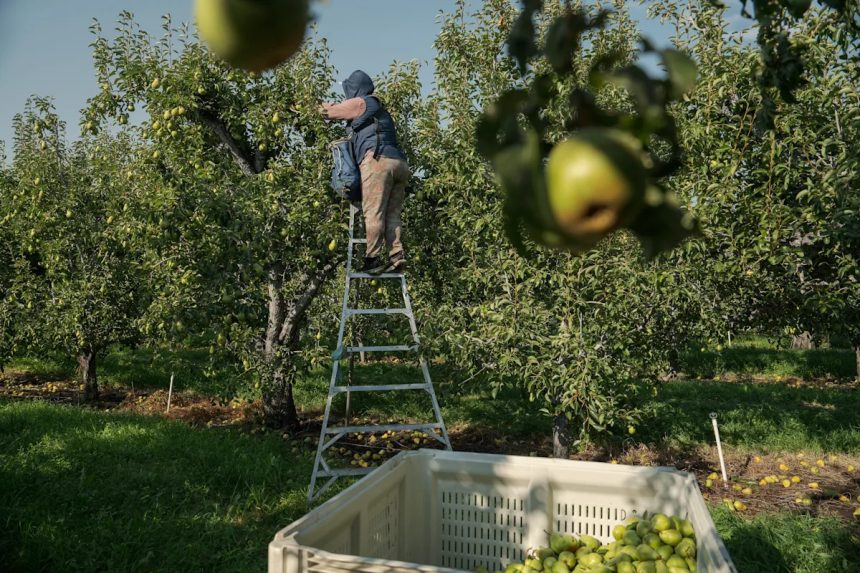One hot day last summer, Clarisa Lugo was inspecting and counting corn and soybean plants in the middle of a 300-acre farm field in Illinois when she started throwing up and panting. Her heart raced, she stopped sweating and a pounding headache didn’t go away for hours.
The heat index — a blend of temperature and humidity — had hit 105 F (40.56 C), and Lugo, who was eight months pregnant, was suffering from heat illness.
“I remember that that day it was hard for me to go back to normal” despite drinking water and putting ice on her body, she recalled.
Agricultural workers are already among the most vulnerable to extreme heat, and pregnant workers are coming under greater risk as temperatures rise because of climate change. Many in the U.S. are low-income Latino immigrants who toil under the sizzling sun or in humid nurseries open year round. Heat exposure has been linked to many extra risks for pregnant people, and while protections exist, experts say they need better enforcement and more safeguards are needed.
Compounding these risks is the Trump administration’s immigration crackdown. Many people are too afraid to seek medical and maternal care, according to research and interviews with advocates and health care providers, and are increasingly fearful of retribution if they advocate for safe work environments.
The Associated Press interviewed four agricultural workers who recounted experiences of working in extreme heat while pregnant. Three spoke under the condition of anonymity because they’re in the country illegally or fear reprisals from their employers.
Temperature rise in big agricultural states
California, one of the nation’s most agriculturally productive states, employed more than 893,000 agricultural workers in 2023, according to state data. Iowa, also among the top 10 agriculture-producing states, provides more than 385,000 jobs in the agriculture industry, according to a 2024 study.
Since the start of the 20th century, California temperatures have increased almost 3 F (1.67 C), according to state and federal data. Warming has accelerated, and seven of the past eight years in that state through 2024 were the warmest on record. Iowa has seen temperatures increase by more than 1 F (0.56 C) during the same period while in Florida, another big agriculture state, average temperatures have increased by more than 2 F (1.11 C).
When it comes to how the body reacts, even small temperature increases can make a difference.
One study found that agricultural workers had more than 35 times the risk of heat-related deaths than other workers. But deaths are hard to track and are likely undercounted. In the U.S., an estimated one-third of farmworkers are women — an increasing share of the farm workforce.
Lugo and her baby ended up fine. But others haven’t been so lucky.
As one nursery worker in Florida put it: “I’ve wanted to leave this work,” but “I have to fight for my children.”
Dangers of heat and exertion
An agricultural worker recalled working in a Florida nursery in 2010 amid intense heat. She was four months pregnant and would spend hours carrying heavy pots of plants and bent over weeding and planting indoor foliage such as monsteras. At work one day, she felt painful abdominal cramping. She knew something was wrong when she saw blood in the toilet.
“(At the hospital) they told me that I had already lost the baby,” she said. She believes the physical work combined with heat caused her miscarriage.
Another nursery worker in Florida worked four months into her pregnancy in 2024, vomiting — sometimes after drinking water — and feeling nausea and headaches in part because of the heat.
Her baby was born prematurely, at seven months. “(The doctor) told me that I spent too much time bent over … and I wasn’t eating well for the same reason, because of the heat,” she said.
Pregnancy increases the risks of extreme heat because the body has to work harder to cool down. Heat exposure has been linked to increased risk of miscarriages, stillbirths, preterm births, low birth weight and birth defects.
Combining pregnancy and heat with physical labor can more quickly overwhelm the body’s cooling system, increasing the likelihood of dehydration, heat illness and heat stroke. Even short-term exposure to heat can increase the risk of severe maternal health complications, such as high blood pressure disorders of pregnancy, according to the Environmental Protection Agency.
In the worst cases, it can kill.
Maria Isabel Vasquez Jimenez was 17 and two months pregnant when she died in 2008 from heatstroke after pruning grapes in a California farm. Her supervisors failed to provide shade and water while she worked for hours in nearly triple-digit heat, authorities said.
California’s outdoor heat standard, enacted in 2005, was later named in Jimenez’s honor.
Unclear how sporadic regulations may benefit farmworkers
No federal heat protections exist in the U.S., although the Trump administration appears to be moving forward with a proposed rule. Some states, including California and Washington, have their own protections, while others, like Texas and Florida, have barred local governments from implementing their own. In states with protections, advocates say they’re not adequately enforced and pointed to a widespread distrust of reporting systems.
More than 30 states and cities have laws requiring employers to provide accommodations for pregnant workers. Most recently, 2023’s federal Pregnant Workers Fairness Act requires employers to provide “reasonable accommodations” to pregnant workers, those who recently gave birth or have medical conditions related to birth or pregnancy unless they will cause the employer “undue hardship.” Other laws make it illegal to fire or discriminate due to those factors.
Even so, there aren’t enough legal protections for pregnant workers, said Ayana DeGaia, assistant professor of obstetrics and gynecology at the University of Washington in Harborview. “It’s probably one of the reasons why we have some of the highest rates of maternal and infant mortality in high-income countries in the world,” she said.
It’s also unclear how some of these protections benefit women farmworkers, said Alexis Handal, an associate professor at the University of Michigan, who led a recent study examining the experiences of the state’s women farmworkers.
In Florida, a top U.S. producer of indoor plants and tropical foliage, the nursery industry’s mostly women workers have joined a fight for heat protections. In California, workers have been advocating for guaranteed compensation when they lose wages due to heat waves and other extreme weather events, as well as extra pay when they work during dangerous weather conditions.
Immigration enforcement compounds challenges to care
Trump’s immigration crackdown has instilled deep fear in immigrant communities.
In California, a physician said her clinic recently had a patient suspected of carrying a fetus with birth defects. They set her up for specialty consultation and care about two hours from home. But the woman couldn’t access that care during her pregnancy. Arranging transportation and child care was difficult. The overarching reason, however, was fear, in part of being detained, said Dr. Katherine Gabriel-Cox, director of obstetrics, midwifery and gynecology at Salud Para La Gente, a community health center.
She added that she hears similar stories “over and over.”
It’s a growing concern nationally. Health care providers have reported seeing fewer walk-ins, patients delaying prenatal care, and more pregnant patients whose first doctor’s visit was for labor and delivery, according to a brief published in April by the group Physicians for Human Rights. Others have reported an increase in no-shows and canceled appointments.
“I’d be concerned that people are not going to present for medical care until it’s too late,” said Katherine Peeler, medical adviser with Physicians for Human Rights and assistant professor of pediatrics at Harvard Medical School.
Pregnant farmworkers in rural areas already have less access to maternity care because clinics are farther away and finding transportation could be difficult. Other times, they can’t afford to miss hours of work or aren’t given time off. Many also don’t get employer-sponsored medical care or paid leave.
Work and home conditions can heighten risks
Farmworkers are less likely to demand employers provide adequate shade, water or rest, or speak out when they’re feeling heat illness for fear of being fired or having immigration enforcement officials called on them, said Juan Declet-Barreto, senior social scientist for climate vulnerability with the Union of Concerned Scientists.
Some workers who spoke with the AP described employers who wouldn’t provide accommodations or water, face covers or other equipment to protect them from pesticides and heat. They continued working during pregnancy out of necessity.
“There were times when my back and entire body hurt … but I had to do it,” said a third nursery worker from Florida. “No one was helping me, and so I had to keep going. If not, no one was going to pay my bills.”
The nursery worker who had a miscarriage said she had to urinate often during pregnancy, but the portable toilets were up to a 10-minute walk away. Another described dirty bathrooms infested with flies. And another recalled pregnant women who were only allowed to use the bathroom during scheduled breaks.
Yunuen Ibarra, programs director with Líderes Campesinas, a farmworker advocacy organization, said women working in agriculture who have been sexually assaulted at work can also be more vulnerable to heat. They might cover their bodies with extra clothing “to not feel exposed to a potential assault,” she said, which can raise their body temperature.
At home, farmworkers might find little escape from extreme temperatures because they are more likely to lack air conditioning, be lower income or live in hotter areas, multiple studies have shown.
As human-caused climate change continues, heat waves will only get longer, hotter and more frequent. Without adequate protections and enforcement, pregnant farmworkers and their unborn babies will suffer the consequences.
“We can’t prevent temperatures from rising,” said Ibarra, “but we can prevent farmworkers from dying or feeling sick or being disabled due to heat-related illnesses.”
___
The Associated Press receives support from the Walton Family Foundation for coverage of water and environmental policy. The AP is solely responsible for all content. For all of AP’s environmental coverage, visit https://apnews.com/hub/climate-and-environment









